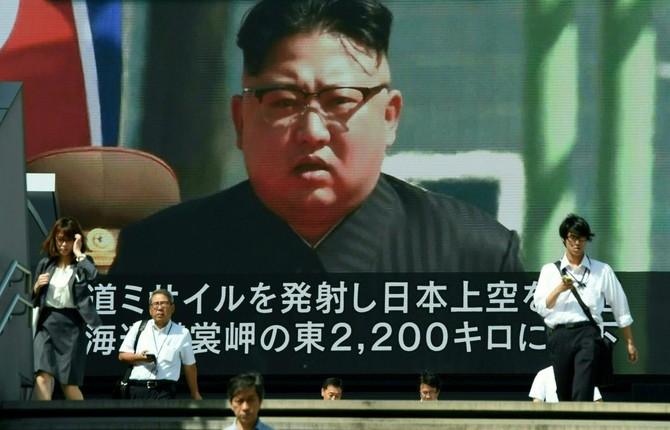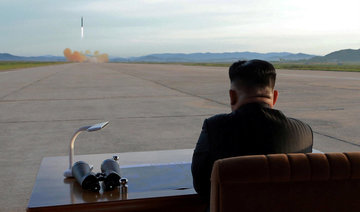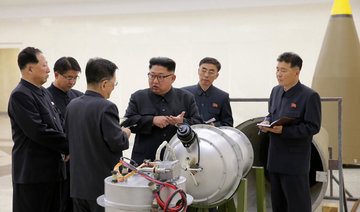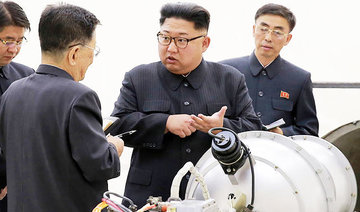TOKYO: Take cover in a sturdy building or get underground.
That’s the emergency advice given to the Japanese people in the event of a North Korean missile strike.
But there are two big problems: most Japanese homes are made of wood and lack a basement. In the countryside, there is often no building made of concrete.
And with only a matter of minutes from launch to impact, there’s simply no time to take cover.
As North Korea this week fired its second missile over Japan in less than a month and threatened to “sink” the country into the sea with nuclear weapons, many Japanese feel a sense of helplessness in the face of the threat from Pyongyang.
Sushi chef Isamu Oya, 67, who runs a restaurant in the small fishing town of Erimo, right under the flightpath of Friday’s missile, summed up the feelings of many.
“The government told us to take cover in a stable building or underground, but there isn’t one here. We have no choice but just do nothing.
“Scary? Yes, but we can’t help it.”
Japan is one of the most seismically active countries in the world and also prone to extreme weather events, so citizens are well-drilled in emergency evacuation, and the authorities have a slick — if not infallible — warning system in place.
When the missile was detected, the J-Alert system immediately kicked in, warnings blared from loudspeakers, regular TV programming was interrupted and text messages sent to every mobile phone.
Local authorities and schools regularly stage drills to prepare residents in the event of a big earthquake and this year many exercises included practicing how to take cover if a missile is launched.
South Koreans have lived under the threat of attack from the North for decades, and are renowned for their phlegmatic attitude to its provocations.
When Seoul holds its regular civil defense exercises, officials often struggle to usher citizens into the underground shelters that are spread throughout the country.
Life carried on as usual in Seoul on Friday, and while the stock market initially fell on news of the missile test, within a few hours it was in positive territory.
“For me, it’s just business as usual,” said former businessman Noh Suk-Won, 60. “The North is flexing its military muscle to force the US to engage in negotiations. It’s not going to throw missiles on our heads.”
But polls show the Japanese are far from blase about the threat.
In a survey published last week by the NHK channel, more than half (52 percent) said they were “very worried” and around one third said they were “worried to some extent.”
Only two percent of those polled said they were “not worried at all.”
Machiko Watanabe, 66, a former office worker, said she was “scared about it every day.”
“I don’t think there is any way to protect yourself. The government and experts say ‘curl yourself in a ball’ and things like that. But there’s no way you can survive.”
With the threat growing and missiles becoming an all-too-frequent wake-up call, Japan is seeking to beef up its defenses.
Japan’s defense ministry has requested its largest-ever annual budget, seeking to develop systems to intercept simultaneous missile launches and to add a land-based Aegis missile defense scheme to complement its sea-based system.
But some are taking matters into their own hands.
Shelter maker Oribe Seiki Seisakusho, based in the western city of Kobe, has reported a healthy increase in demand given the recent tensions on the Korean peninsula.
“With the North Korean situation as it is, and with the J-alert ringing, people don’t know where to escape to,” Nobuko Oribe, an executive at the firm, told AFP.
Demand is mainly coming from “families who are building new houses and small business owners who want to build shelters for their employees near their factories or offices.”
However, a shelter is not an option for the masses. It takes four months to build and costs a hefty 25 million yen ($226,000) for a unit to keep 13 people safe.
On the streets of Tokyo, some were carrying on regardless.
Ken Tanaka, a 21-year-old freelance web designer, said he “didn’t care” about the launch, believing that the Japanese capital and its 14 million people would be safe in the event of a North Korean attack.
“I don’t think North Korea would dare to attack Tokyo and the capital area. I’m not thinking about it very much as a Tokyo resident,” he told AFP.
“I’m 21 years old and it doesn’t seem real to me.”
‘Take cover’ — but where? Japanese helpless over North Korea threat
‘Take cover’ — but where? Japanese helpless over North Korea threat

Prosecutors seek up to 14-year terms for French rape trial defendants

Until Wednesday, or latest Thursday morning, prosecutors are outlining their sentencing demands for all the defendants
AVIGNON, France: French prosecutors on Tuesday demanded sentences of up to 14 years for some of the remaining co-defendants of a man charged with enlisting dozens of strangers to rape his wife while she was drugged and unconscious.
On Monday, prosecutors requested a maximum 20-year jail term for Dominique Pelicot, who has been on trial in the southern city of Avignon since September with 49 other men for organizing the rapes and sexual abuse of Gisele Pelicot, now his former wife.
One man is being tried in absentia.
The case has sparked horror, protests and a debate about male violence in France, with tens of thousands of protesters staging demonstrations across the country on Saturday against violence targeting women.
The decade-long abuse of Gisele Pelicot by Dominque Pelicot was only uncovered when he was arrested for a separate upskirting offense, leading investigators to discover his meticulously-kept records of the visitors to the family home in the town Mazan.
Until Wednesday, or latest Thursday morning, prosecutors are outlining their sentencing demands for all the defendants, most of whom come from ordinary professions ranging from the fire brigade to the media.
On Tuesday, public prosecutor Laure Chabaud asked for a 14-year sentence for Karim S., 38, who was one of the few defendants whose messaging with Dominique Pelicot was discovered by investigators.
For Florian R., 32, who did not admit “intent” and Gregory S., 31, who was “aware of Gisele Pelicot’s altered state,” Chabaud demanded thirteen years in prison.
Some defense lawyers have described the sentencing demands as “staggering” and “out of proportion,” alleging the public prosecutor’s office was under pressure from “public opinion.”
“I fear what will happen next,” said Louis-Alain Lemaire, a lawyer for four defendants.
But public prosecutors say the trial should herald a fundamental change in society.
“In 2024, we can no longer say ‘she didn’t say anything, she agreed,’ that’s from another era,” Chabaud said on Monday.
Prosecutors asked for a 12-year sentence for nine of the remaining defendants, including Boris M., 37, who claimed during the hearings that he, too, was a victim.
“He says he was a victim of Dominique Pelicot, like Gisele Pelicot,” prosecutor Jean-Francois Mayet said.
But “at no time did he seek or obtain Gisele Pelicot’s consent,” he said, adding, “in reality, he was pleased with the situation presented to him” by the main defendant.
Prosecutors sought a 12-year sentence for Mahdi D., 36, who also claimed to be a victim of Dominique Pelicot’s actions.
Chabaud also asked for 12-years for Lionel R., 44, who said he was taking “part in a couple’s fantasy.”
Many of the accused argued in court that they believed Pelicot’s claim that they were participating in a libertine fantasy, in which his wife had consented to sexual contact and was only pretending to be asleep.
Among them, 33 have also claimed they were not in their right minds when they abused or raped Gisele Pelicot, a defense not backed by any of the psychological reports compiled by court-appointed experts.
Prosecutors also sought a 12-year jail term for Cyril B., 47, who “was well aware Gisele Pelicot should not be woken up,” and for Thierry P., 54, who said Dominique Pelicot was “solely responsible,” the public prosecutor said.
Mayet demanded the same prison sentence for Omar D., 36, who argued “the husband’s consent and presence seemed to be sufficient,” and Ahmed T., 54, who “denies any responsibility.”
Two other defendants, Redouane A., 40, who said he came to Mazan to “please the couple” and Jean T., 52, who claimed without evidence he was also drugged by the main defendant, are also facing a 12-year jail-term.
On Monday, prosecutors requested a 17-year prison sentence for one defendant, Jean-Pierre M., 63, who applied Pelicot’s practices against his own wife to rape her a dozen times, sometimes in Pelicot’s presence.
The trial has made Gisele Pelicot, who insisted the hearings be held in public, a feminist icon in the fight of women against sexual abuse.
Prosecutor Mayet praised her “courage” and “dignity,” thanking her for allowing the hearings to be held in public.
The verdicts and sentencing are expected by December 20.
Russia vows response to latest Ukraine ATACMS strikes

- Ukraine firing the long-range missiles into Russia for the first time last week prompted a furious reaction from Moscow
- Russia’s defense ministry on Tuesday said Ukraine had carried out fresh strikes — on November 23 and 25 — using ATACMS
MOSCOW: Moscow’s military on Tuesday pledged a response to fresh Ukrainian air attacks inside Russia using US-supplied ATACMS missiles.
Ukraine firing the long-range missiles into Russia for the first time last week prompted a furious reaction from Moscow.
Russia’s defense ministry on Tuesday said Ukraine had carried out fresh strikes — on November 23 and 25 — using ATACMS.
“Retaliatory actions are being prepared,” it said in a post on Telegram, without elaborating.
The United States gave Ukraine permission to use the weapons to hit Russian territory earlier this month after months of requests from Kyiv.
In a rare admission, Russia said the fresh strikes had caused damage to military hardware and wounded some of its personnel on the ground.
A strike on the Kursk Vostochny air base wounded two servicemen, the defense ministry said, while a strike on an air defense battery damaged a radar system and also caused “casualties.”
It said three of the five missiles fired in the first strike were shot down, while seven of the eight used in the second were destroyed.
Moscow rarely provides such specific details on Ukrainian aerial attacks and almost never admits missiles have reached their intended target.
The defense ministry also posted photos of what it said were the missile fragments, showing large casings with English-language inscriptions on the side.
AFP was unable to immediately verify the images.
The strikes come with tensions having ratched up dramatically in the near three-year conflict over the last few weeks.
Putin last week signed a decree lowering the threshold for the use of nuclear weapons, days before launching the nuclear-capable hypersonic Oreshnik missile at Ukraine.
US Air Force in UK says a small number of drones spotted flying over bases in eastern England

- The Air Force hasn’t identified who is believed to be behind the incursions
- Unspecified mitigation measures are underway
LONDON: The US Air Force says a number of small drones have been detected near three bases in eastern England that are used by American forces.
Tuesday’s ongoing incident comes just days after drones were spotted near RAF Lakenheath, RAF Mildenhall and RAF Feltwell. They were actively monitored after they were seen in the vicinity of and over the three bases, US Air Forces Europe said in a statement on Sunday.
The Air Force hasn’t identified who is believed to be behind the incursions. Unspecified mitigation measures are underway.
Lakenheath is home to the 48th Fighter Wing, which the US Air Force describes as the foundation of its combat capability in Europe. Mildenhall hosts the 100th Air Refueling Wing, and Feltwell is a hub for housing, schools and other services.
Lakenheath, Mildenhall and Feltwell, located close to one another in the counties of Suffolk and Norfolk, are Royal Air Force bases used primarily by the US Air Force
Death toll from Hindu-Muslim clashes sparked by mosque survey rises to six in India

- Street battles broke out in a bid to block a team of surveyors from the government from entering the Shahi Jama Masjid in Sambhal
- Hindu activist groups have laid claim to several mosques they say were built over Hindu temples during Muslim Mughal rule
Lucknow, India: The death toll from violent protests in India sparked by a survey into whether a centuries-old mosque was built on a Hindu temple has risen to six, an official said Tuesday.
Around 20 police officers were also wounded during the violence on Sunday in Sambhal in India’s northern state of Uttar Pradesh, district magistrate Chirag Goyal told AFP.
Street battles broke out in a bid to block a team of surveyors from the government’s Archaeological Survey of India (ASI) from entering the Shahi Jama Masjid in Sambhal.
The six Muslim men were killed by gunfire — with Goyal saying they were shot by fellow protesters.
“The six killed were caught in crossfire by rioters using homemade pistols,” he said. “The police only fired tear gas and rubber bullets.”
Two people were initially reported dead on Sunday, but more details emerged later, while others later died of their wounds.
Goyal said 25 people had been arrested following the violence.
Hindu activist groups have laid claim to several mosques they say were built over Hindu temples during the Muslim Mughal empire centuries ago.
The survey in Sambhal was ordered by a local court, after a petition from a Hindu priest this month claimed it was built on the site of a Hindu temple.
Within hours the court ordered a survey of the mosque, a decision protested by local Muslim residents.
The first survey was undertaken on November 19. A second survey four days later, which included taking photos and video of the mosque’s features, triggered the violence.
The hilltop Shahi Jama Masjid was built in 1526 during the rule of Mughal emperors Babur and Humayun, according to historians, with renovations during the 17th century.
Hindu nationalist activists were emboldened earlier this year when Prime Minister Narendra Modi inaugurated a grand new Hindu temple in the northern city of Ayodhya, built on grounds once home to the centuries-old Babri mosque.
That mosque was torn down in 1992 in a campaign spearheaded by members of Modi’s party, sparking sectarian riots that killed 2,000 people nationwide, most of them Muslims.
Some Hindu campaigners see an ideological patron in Modi.
Calls for India to more closely align the country’s officially secular political system with its majority Hindu faith have rapidly grown louder since Modi was swept to office in 2014.
It has made the country’s roughly 210-million-strong Muslim minority increasingly anxious about their future.
Philippines, UAE pledge stronger economic ties as Marcos marks first visit

- Marcos is the first Philippine president to visit Abu Dhabi in more than 15 years
- UAE president says he looks forward to talks on a free trade deal with the Philippines
Manila: The Philippines and the UAE on Tuesday committed to boosting economic relations as Philippine President Ferdinand Marcos Jr. marked his first official trip to Abu Dhabi.
On his one-day trip, Marcos was received by UAE President Sheikh Mohammed bin Zayed.
He is the first Philippine president to visit the UAE since Gloria Macapagal-Arroyo in 2008.
During the meeting, the two leaders committed “to deepening cooperation in various areas, including economy, trade and sustainability,” Marcos’ office said in a statement.
“The two leaders emphasized their dedication to strengthening bilateral ties and delivering lasting benefits to their peoples, coinciding with the 50th anniversary of friendship and collaboration between their nations.”
The Philippines and the UAE celebrated 50 years of diplomatic relations on Aug. 19.
Emirati state news agency WAM cited Sheikh Mohammed as saying that he hoped the visit “would herald a new and significant chapter” in UAE-Philippine ties and that the UAE “looks forward to continuing discussions toward reaching a Comprehensive Economic Partnership Agreement with the Philippines to elevate trade and investment relations to new heights of mutual economic growth.”
Negotiations on the free trade deal have been underway between Philippine and UAE officials since the beginning of this year.
The UAE is a key trading partner of the Philippines in the region and home to the second-largest Filipino diaspora after Saudi Arabia.
Some 700,000 overseas Filipino workers live and work in the UAE. Many are employed in the construction, healthcare and hospitality sectors.
Marcos was initially expected to meet representatives of the Filipino community, but his visit was shortened, with the Philippine Presidential Communications Office saying he would “immediately fly back to Manila to resume his personal supervision and inspection of the relief and reconstruction activities in communities devastated by six successive typhoons.”
















